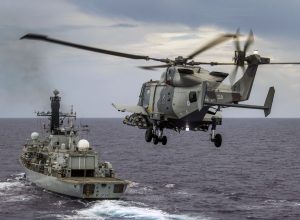Since its official launch as a multinational force at the 2014 NATO summit in Wales almost a decade ago, the United Kingdom-led Joint Expeditionary Force (JEF) has consolidated itself as a multinational military framework composed of NATO members without being a part of the alliance itself. Alongside Britain, other JEF members include Denmark, Estonia, Finland, Iceland, Latvia, Lithuania, the Netherlands, Norway, and Sweden. With its “opt-in” coalition of the willing design meant to pool the resources of its 10 members on a rapid response basis, the JEF is an able partnership that has increased allied interoperability and military readiness since becoming fully operational in 2018.
Although Europe does not have much of an expeditionary capacity in the Indo-Pacific, the JEF could potentially provide a framework to coalesce the military capabilities of willing states alongside the British Armed Forces in the Indo-Pacific. Although the JEF’s current area of operations is in Northern Europe and the Arctic Circle, it was originally envisioned to be a globally-reaching force when first introduced in 2012. This, combined with its versatile structure, makes it a potentially strong candidate to grow Europe’s presence in the Indo-Pacific.
Even as the Russo-Ukrainian War continues, European security policymakers are increasingly wary of China potentially disrupting maritime commerce, the threat of potential Chinese aggression to the rules-based international order, and the possibility of a future isolationist U.S. presidency reducing the U.S. military presence in the region significantly. Consequently, Europe is considering its capabilities in promoting a “free and open Indo-Pacific” and bolstering its security presence in the region.
These concerns have already driven the United Kingdom’s own “tilt” to the Indo-Pacific, and its European allies could build upon this existing momentum for their own benefit. Notably, the Norwegian Navy is already looking to join the U.K. Carrier Strike Group’s deployment to the region in 2025 with a frigate, and Britain has committed to beginning regular trilateral military exercises with the United States and Japan in the same year. If more JEF members are willing to extend its operations into the Indo-Pacific, they could reap some of the benefits of Britain’s existing security presence and arrangements in the region, such as the usage of U.K. military facilities in Oman, the United Arab Emirates, and Singapore.
There is also now a logical extension of the JEF into the Indo-Pacific due to its existing activities in the Arctic Circle, as the Northern Sea Route present in the summer can act as a direct conduit between the Atlantic and Pacific Oceans.
The JEF’s regional scope could grow to encompass part of the Indo-Pacific if it enlarges to include Indo-Pacific members as well. Britain already has several security partnerships with Indo-Pacific states that could provide an opportunity for them to discuss one day joining the JEF, such as a Reciprocal Access Agreement (RAA) with Japan, the Downing Street Accord with South Korea, the Five Power Defense Arrangements (FPDA) with Australia, New Zealand, Malaysia, and Singapore, and AUKUS.
These collaborative tendencies extend past Britain to the rest of Europe as well, as the Indo-Pacific 4 (IP4: Japan, South Korea, Australia, and New Zealand) have already committed to increasing interoperability and other forms of security cooperation with NATO members. Even European states that are not part of the JEF, such as France, Germany, and Italy, have all pushed to grow their security presence in the region, including the former two participating in multilateral aerial exercises with Australia.
That said, any enlargement of JEF, both in its regions of operation and membership, would need to be approved by all current members before proceeding. Not all European states, including current JEF members, would necessarily be so keen on increasing their reach in the Indo-Pacific, even when considering the JEF’s opt-in and ad hoc nature. The JEF additionally already faces the threat of Russian aggression in Northern European and Arctic regions amid the Russo-Ukrainian War, and JEF policymakers may argue that growing its regional scope would merely overextend it when the JEF needs to maintain its momentum in offering observer membership to Ukraine.
Yet, because every JEF member is in NATO, the best way to develop a consensus toward enlargement may be found within the alliance. While NATO remains dedicated to transatlantic security, it has likewise grown attentive to the potential knock-on impacts of a Chinese-triggered Indo-Pacific crisis, and accordingly pushed to strengthen relations with the IP4. A consensus among NATO members that Europe should increase its security presence in the region would therefore be the most likely impetus for the JEF to expand toward the Indo-Pacific.
And, although matters related to Ukraine’s defense should remain at the top of the JEF’s priorities, Ukraine’s engagement with the JEF could provide a membership path model for future Indo-Pacific partners. To that end, the JEF should consider offering observer roles to the IP4, with the possibility of extending them to Malaysia and Singapore in the future, to develop momentum in the JEF’s Indo-Pacific tilt. The IP4 could similarly play a role in the JEF’s assistance to Ukraine as well, especially considering the aid these four countries have already provided in Ukraine’s defense and reconstruction.
Nevertheless, as Europe grows interested in promoting a free and open Indo-Pacific, it will be essential for it to develop a framework to bolster its security presence in the region. This year, by its tenth anniversary as a multinational concept, the JEF has already demonstrated versatility as a framework for improving security collaboration between its 10 members. Europe can thus use the JEF as a springboard to grow its security-related outreach to the Indo-Pacific, but only if there is consensus in NATO for it to do so.

































